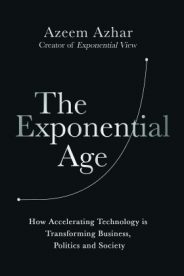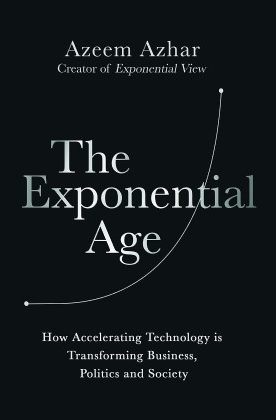Azeem Azhar is the creator of the Exponential View, a global platform for in-depth tech analysis. His weekly newsletter is read by 45,000 people from around the world, and his chart-topping podcast has featured guests including Yuval Noah Harari, Reid Hoffman, and Tony Blair. The founder of a number of successful tech companies, Azhar is a member of the World Economic Forum’s Global Futures Council, a senior advisor at PwC, and a contributor to publications including the Financial Times, Prospect, and the MIT Technology Review. He lives in London.
About The Exponential Age: How Accelerating Technology is Transforming Business, Politics and Society
From Azeem Azhar, renowned technology analyst and host of the global tech podcast Exponential View, comes a bold exploration and call-to-arms over the widening gap between AI, automation, and big data―and our ability to deal with its effects.
We are living in the first exponential age.
High-tech innovations are created at a dazzling speed; technological forces we barely understand remake our homes and workplaces; centuries-old tenets of politics and economics are upturned by new technologies. It all points to a world that is getting faster at a dizzying pace.
Azeem Azhar knows this better than most. Over the last three decades he has founded companies bought by Amazon and Microsoft, served as the Economist’s first ever internet correspondent, and created a leading international tech newsletter and podcast, the Exponential View.
Now, Azhar offers a revelatory new model for understanding how technology―especially that of Facebook, Apple, Amazon, Netflix, Google, and Spotify―is changing the world. He roots his analysis in the idea of an “exponential gap,” in which technological changes rapidly outpace our society’s ability to catch up with them. Azhar shows that this divide explains many problems of our time―from political polarization to ballooning inequality to unchecked corporate power. With stunning clarity of vision, he delves into how the exponential gap is a near-inevitable consequence of the rise of AI, automation, and big data. And he offers a set of policy solutions that can prevent the growing exponential gap from destroying our societies.
The result is a wholly new way to think about technology. It will transform your understanding of the economy, politics, and the future.



